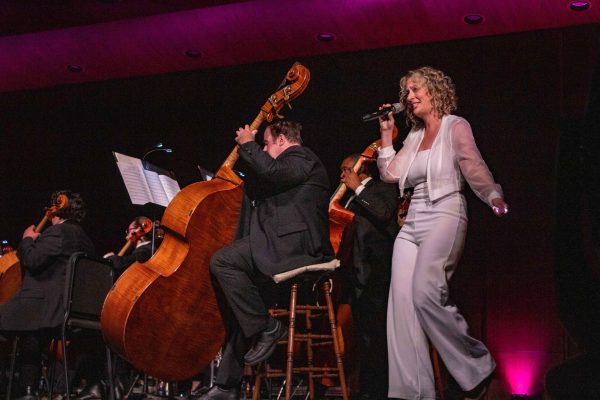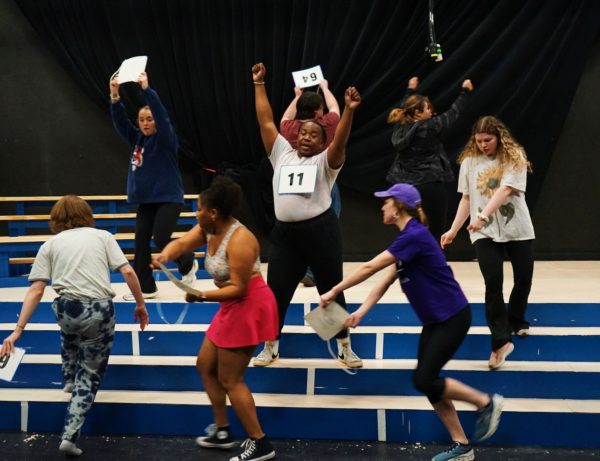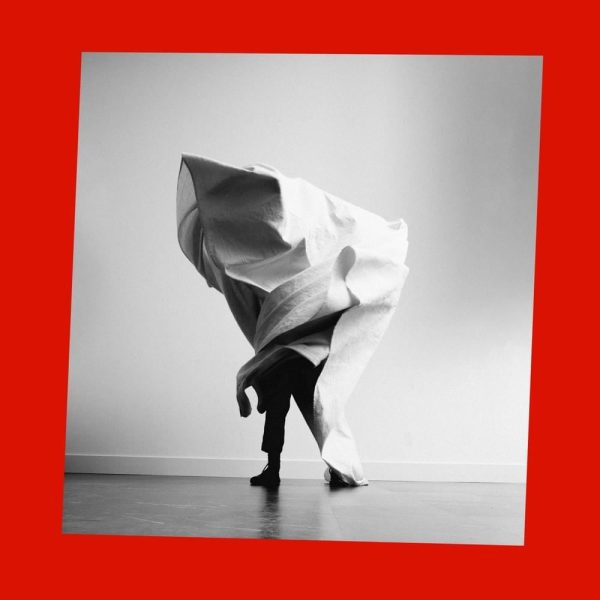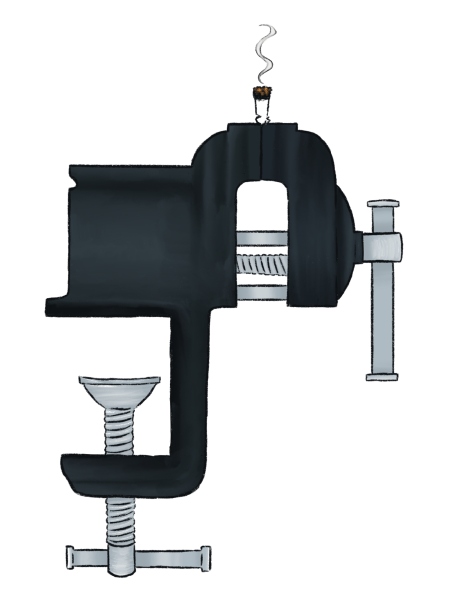Play Review: ‘Moon Over Buffalo’
Play Review
October 7, 2021
I will be the first to admit that I did not have high expectations going into the play. When it comes to community theater the show can either be unexpectedly amazing or overwhelmingly cringeworthy. I’m happy to say that the “Moon Over Buffalo,” directed by Michael Green, was far from cringeworthy.
It was a spectacular show carried by its superstar cast and exceptional stage crew. Despite the astounding castand crew, I do have my complaints about this show, but those complaints are vastly overshadowed by howenjoyable the show was overall.
It was the type of show that makes one appreciate the dedication that goes into community theater.
Originally written by Ken Ludwig, whose work has been performed everywhere from Broadway toLondon’s West End, the show presents George and Charlotte Hay (played respectively by Christopher Spencer and Elizabeth Ragsdale) a husband and wife performing shows like “Private Lives” and “Cyranode Bergerac” in rep (which as I came to discover during the show meant that the company acted outed arepertoire of specific plays in rotation) both slowly growing apart due to their own desires in life.
They are supported by a strong supporting class including, but not limited to: Charlotte’s disgruntled and deaf mother, Ethel (Amber Rhodes); their daughter Rosalind/Roz (Lucy Lemaster Hill) who has rejected the theater life and is trying to have a “normal” life; her oblivious fiancé Howard (Tyler Hudson); the stage manager for George’s production and Roz’s former fiancé Paul (Michael Hill); George’s “side-piece,”Eileen (Kirstin Pace); and a wealthy lawyer courting Charlotte, Richard (Wesley Thompson).
The show relies heavily on slap-stick humor and sexual innuendos that may be a bit too on the nose. The performances have so much going on but never so much that overwhelms.
Charlotte grows dissatisfied with performing on the stage: still holding aspirations of Hollywood stardom. George is content with stage performances, disgruntled with the Hollywood scene.
George has a wandering eye and is at timesunbearably melodramatic. Charlotte starts as a loving wife but quickly grows frustrated and discontent with George and their current company.
There is obviously a large disconnect between the partners but it does little to bring the energy of the cast down and stop the laughs from coming. It is difficult to find anything with the acting or the cast.
If you were to get nitpicky with some of the details you could mention the stage crew not pulling the curtain to a close when they changed the scene or some inconsistency with the costumes but none of these are large enough issues to take away from how enjoyable the show was overall.
Aside from its slap-stick approach to humor, it has a huge focus on physical performance that left me feeling drained. (And I was just watching it!) Spencer and Ragsdales’ first entrance into the play was a playful fencing match that quickly took over the set.
It was quite the spectacle but it also marked the first of several times where Hudson (playing Roz’s Fiancé, Howard) just got lost in translation. It isn’t so much that he wasn’t performing well or standing out, the scenes he had by himself were hilarious, but when in a scene with the other performers he just seemed to fade away a little bit. I truly think it had more to do with how physical and high energy the other members of the cast were.
Spencer having to jump from low-energy, more disgruntled to high-energy and panicky and Ragsdale doing several on stage costume changes and fits of rage at (1) her husband’s affairs and (2) the play they were performing being observed by a big hollywood hotshot (Frank Capra).
Rhodes easily stole every scene she was in, be it having her hearing-aids on, making a special batch of Irish Coffee, or stomping off stage in a regency era gown while pouting like a child. They all brought something special to each scene.
As I had already stated Hudson sort of faded but I do believe he performed his character well. The same could be said for Lemaster Hill (playing Roz), Hill (playing Paul), Pace (playing Eileen), and Thompson (playing Richard) but none if it had to do with actors but the writing.
There is an overarching story arch featuring the Hay’s trying to pull together their mess of a production for a chance at Hollywood stardom; this is spaced out with many branching storylines that were tied up a little too messily.
It gave some actors more time to bring the humor and firmly ground the characters’ personalities. Despite this each performer did get a chance to shine even if they faded to the back at times.
Spencer performs the entire second half of the play like he’s drunk. Ragsdale gets to beat the ever-loving light out of her “husband” with a rolled up newspaper. Rhodes closes the entire show with a perfectly timed one-liner .
Lemester Hill carried the actual “play” segment of the show. Hill having to endure some poor-taste jokes with absolute professionalism.
Hudson accidentally scares the lights out of Spencer’s character when he shows up dressed as George Patton. Paces’ entrance and her violent sobbing.
Thompson’s character delivers a sweet proposal to Charlotte. (I’m sorry Charlotte but I would’ve chosen him over George anyday.) All in all I loved almost everything.
Although there were times in the “Moon Over Buffalo” that I wasn’t too thrilled over: it was a campy, fun, and enjoyable ride throughout that speaks tides of how talented these performers were.
It’s incredibly vital that we can enjoy such shows considering the past few years we’ve all been through, and if we could properly follow guidelines and do as we’re told there is a great chance we could see so much more of this talent that hasn’t dimmed despite all the heat we’ve been through.
All in all, I give the Shoals Theatre’s production of “Moon Over Buffalo” a hard nine out of ten and I can’t wait to see the performances these talented people manage to put on over these coming years.













